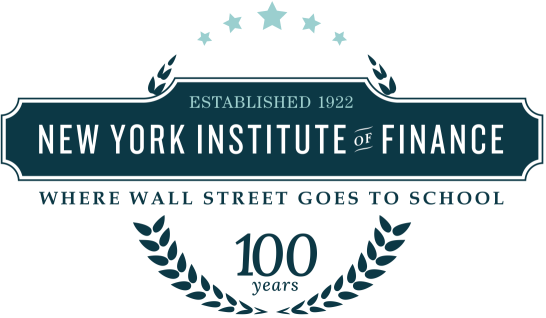Capital Markets Professional Certificate- Virtual Series
May 9-25, 2023 (Meets Tue, Wed, Thu Only) | 8-10AM EST
This course surveys the major financial instruments traded in capital markets around the world. Understand how stocks are valued. Learn how stocks and bonds are brought to market. Understand the basic mechanics and risks characteristics of derivatives. Prerequisite knowledge: Basic MS Excel skills Basic knowledge of capital market structure and participants.
Choose the best derivative to hedge against risk in real-life financial situations. Calculate the profit or loss on futures trades. Construct a swap and calculate the benefit of the swap to each counterparty. Invest the money held by an investment fund both geographically and by asset class. Describe the role of equity from both the issuer’s and investor’s perspectives. Distinguish among the different types of stock markets. Describe the main methods used in equity valuation. Explain the major steps in the IPO process. Identify the key participants in the IPO process. Apply knowledge to today’s financial situations.
Module 1: Equity Indexes
- Market Segmentation
- Index Construction and Weighting
- Bias, Tracking Error and Rebalancing
- Trading and Hedging Strategies using Index Products
Module 2: Equity Valuation
- Uses and Limitations of Valuation
- Valuation Models
- Model Inputs
- Ratio Analysis
- Intrinsic Valuation
- Relative Valuation
- Equity Risk Premium
- Dividend Discount Models
- Method of Comparables
- Enterprise Value and Economic Value Added (EVA)
- Oracle Valuation Case
Module 3: Equity Investment Vehicles
- Mutual Funds
- Hedge Funds
- Private Equity
- Venture Capital
Module 4: Equity and Debt IPOs
- Key Participants
- Timing and Major Steps in IPO Process
Module 5: Equity and Debt Secondary Offerings
- Primary vs Secondary Offering
- Types of Secondary Offerings
- Motivations for Secondary Offerings
Module 6: IPO Workshop
- Case Study
Module 7: Futures and Forwards
- Futures and Forwards Markets
- Exchanges, Clearinghouses and OTC
- Hedging and speculating with Futures
- Trade Execution
- Settlement and Margining
- Bond Futures
- Index Futures
Module 8: Options
- History and Evolution of Options Market
- Options Terminology
- Evaluate Risk/Reward – Payoff Profiles & Break-Evens
- Identify Basic Characteristics of options, caps & floors and swaptions
- Identify Factors of Options Pricing
Module 9: Swaps and Credit Derivatives
- History and Evolution of Swaps
- Characteristics & Features of Swaps
- Fundamentals of Pricing Interest Rate Swaps
- Application of Interest Rate Swaps to Hedging Situations
- FX Swaps
Module 1: Capital Markets and Key Participants
- Introduction to Global Financial Markets
- How Banking and Financial Markets Work Together
- Function of Financial Intermediaries: Indirect Finance
- Types of Financial Intermediaries
- Identifying The Key Participants and Their Impact on the Market
- Four Core Markets: Debt, Equity, Money Markets and Foreign Exchange
- Internationalization of Financial Markets
Module 2: Money Markets
- Interbank Loans and Deposits
- Certificates of Deposit
- Commercial Paper
- Repos
- Treasury Bills
- Bankers Acceptances
Module 3: Foreign Exchange (FX)
- Structure of The FX Market
- How the Market Trades
- Understanding FX Prices - Spot Rates
- Reading Prices and Calculating Simple Values
- Calculating and Understanding Cross Rates
- Introduction to FX Forwards
Module 1: Time Value of Money
- Time Value of Money (TVM)
- Present Value
- Future Value
- Valuing Annuities
- T-Bill Yield
- Bond Equivalent Yield
Module 2: Bond Markets and Risk
- Role of Debt in Capital Structure
- International Bonds
- Plain Vanilla Bonds
- Borrowing Structures
- Price-Yield Relationship
- Yield Curves
- Economy/Business Cycle
- Primary Dealers
- Secondary Markets
- Treasury Auction
- Types Of Bond Risk
- Credit Ratings
- Credit Spreads
Module 3: Equity Markets and Trading
- Common Stock
- Preferred Stock
- Rights/Warrants
- Depository Receipts
- Convertible Bonds
- Primary and Secondary Markets
- Dark Pools
- Quote and Order Driven Markets
- Order Execution
- Short Selling
Module 4: Regulation of the Financial System
- Financial Regulators
- Motivation for Regulation and Oversight
- Asymmetric Information and Financial Regulation
- The 1980s U.S. Banking Crisis
- Banking Crisis Throughout the World
- The Dodd-Frank Bill and Future Regulation
- Basel III

